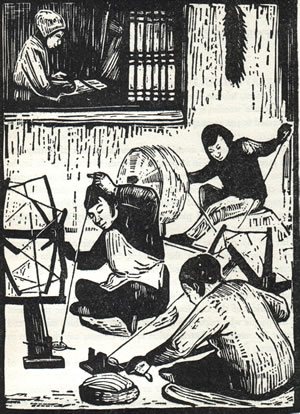Notes from The Challenge of Red China
by
Gunther Stein
For The U.S. War Against Asia
by William P. Meyers
Also sponsored by Peace Pins
Popular pages:
| U.S. War Against Asia |
| Fascism |
| Barack Obama |
| Democratic Party |
| Republican Party |
| Natural Liberation |
Page 3 of 5
 Communist Party members at the end of 1944 numbered about 1.2 million. Most had joined since 1937, and about 90% were peasants, tending to be “middle peasants.” [p. 146]
Communist Party members at the end of 1944 numbered about 1.2 million. Most had joined since 1937, and about 90% were peasants, tending to be “middle peasants.” [p. 146]
Agricultural practice is mainly illustrated with stories of Wu Men-yu, a Labor Hero. Food production and consumption greatly increased as rents were reduced, new methods introduced, and marginal land reclaimed. [p. 157-170]
He describes the industriousness of the people. “Almost everybody, high and low, seemed to put some spare energy into the spinning of wool or cotton yarn.” They made their own weapons, sometimes using machinery captured from the Japanese. “A ten-hour day is normal.” [p. 171- 181.]
Conduct of trade, including smuggling from nationalist areas, is covered in detail. [p. 182-188]
Merchants seemed to be happy with New Democracy policies. They liked begin consulted by the government, the credit and interest policies, and the rising prosperity. There were many new merchants who were former peasants [p 189-195]. The need of the region to issue its own money, and related issues, is discussed [p. 196 – 202]. The communists were able to balance their government budget, unlike the nationalists [ p. 203 – 209].
How cooperative enterprises were run is detailed [p. 210 – 216].
Claims Chiang Kai-shek would not give foreign correspondents permission to quote from his China’s Destiny as that could show that he was not really pro-democracy. [p. 235]
Claims foreign Christian missionaries were positive about the Yenan government. However, the Kuomintang tried to keep new missionaries from entering the area. [p. 236-237]
“Chunking complains today that Yenan is trying to gain the support of a numerous Moslem population in the adjoining Kuomintang territories by pampering the comparatively small number of Moslems in the areas under its control.” [243]
Ting Ling (now Ding Ling), the fiction writer, is interviewed. [251-259]
Education. Communists tried to introduce compulsory education for children and a phonetic alphabet. But the people wanted to learn the old Chinese script and to allow their children to work. The communists accepted that and had a successful campaign to improve adult literacy. [p. 260-267]
